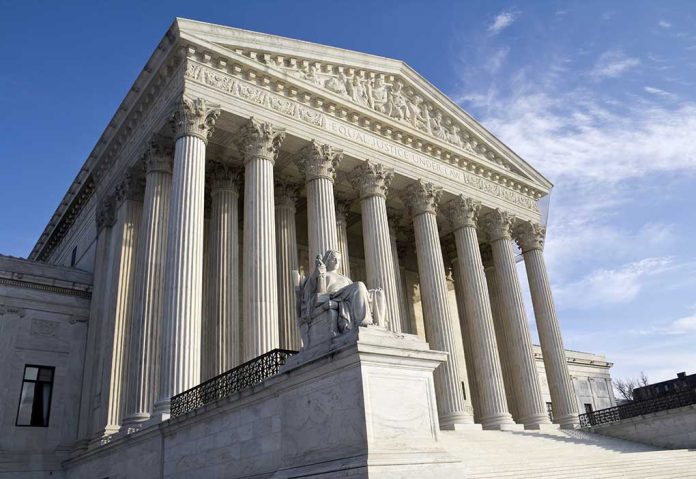
Supreme Court allows New York’s controversial gun restrictions to stand while upholding federal ghost gun regulations in two blows to Second Amendment advocates.
Key Takeaways
- The Supreme Court declined to hear challenges to New York’s Concealed Carry Improvement Act, allowing gun bans in “sensitive locations” and “good moral character” requirements to remain.
- The Court upheld Biden administration regulations on ghost guns in the Garland v. VanDerStok case, expanding ATF authority over partially completed firearm parts.
- While some provisions of New York’s law were struck down by lower courts, restrictions on firearms in schools, hospitals, and public transportation remain enforceable.
- These decisions signal the Court’s selective approach to Second Amendment cases despite its landmark 2022 Bruen ruling that expanded gun rights.
New York Restrictions Survive Supreme Court Scrutiny
The U.S. Supreme Court has declined to hear a challenge to New York’s Concealed Carry Improvement Act, effectively allowing the state’s strict gun control measures to remain in place. By rejecting the case without explanation, the Court leaves intact the Second Circuit Court of Appeals ruling that upheld key provisions of the law while striking down others. The decision represents a victory for New York officials who implemented the restrictions after the Supreme Court overturned the state’s century-old gun licensing system in 2022.
New York’s law establishes numerous “gun-free zones” throughout the state, including public transportation, hospitals, schools, entertainment venues, and parks. It also requires handgun license applicants to demonstrate “good moral character” before receiving a permit to carry. Gun rights activists had hoped the Supreme Court would strike down these provisions as unconstitutional restrictions on Second Amendment rights.
WASHINGTON: The Supreme Court declined to hear a challenge to New York’s gun law, leaving in place restrictions on concealed carry in “sensitive locations” like public transit, parks, hospitals, schools, houses of worship, and entertainment venues. pic.twitter.com/tCFLfXCIV0
— KolHaolam (@KolHaolam) April 8, 2025
Appeals Court Decision Remains in Effect
The Second Circuit Court of Appeals’ October ruling struck down certain aspects of New York’s law while preserving others. The court blocked requirements for handgun license applicants to disclose their social media accounts and ruled against making it a crime to carry a concealed gun on private property without explicit owner consent. However, the appeals court allowed New York to enforce bans on firearms in sensitive locations and to require proof of “good moral character” from applicants.
Gun rights activists expressed frustration with the Supreme Court’s decision. “While we are disappointed by the Supreme Court’s decision not to take this case, we will never stop fighting to defend the rights of gun owners across the country,” said Erich Pratt of Gun Owners of America.
Ghost Gun Regulations Upheld
In a separate decision, the Supreme Court upheld Biden administration regulations on “ghost guns” in the case Garland v. VanDerStok. This ruling maintains the Bureau of Alcohol, Tobacco, Firearms and Explosives’ (ATF) Final Rule 2021-05F, which redefined “firearm” to include partially completed pistol frames and other gun parts. The regulations target untraceable homemade firearms that have become increasingly popular among gun enthusiasts.
The Biden administration has argued these regulations are necessary to prevent criminals from accessing untraceable weapons, while opponents contend they overreach federal authority and infringe on Second Amendment rights. The Court’s decision signals its willingness to allow certain gun regulations despite its 2022 Bruen decision that expanded gun rights by striking down New York’s previous “proper cause” requirement for concealed carry permits.
Shifting Approach to Second Amendment Cases
The Supreme Court has demonstrated selectivity in addressing gun law challenges since its landmark 2022 ruling in New York State Rifle & Pistol Association v. Bruen. That 6-3 decision found New York’s century-old Sullivan Act requiring “proper cause” for concealed carry permits violated the Second and Fourteenth Amendments. Chief Justice John Roberts and Justice Brett Kavanaugh noted at the time that states could impose licensing requirements but needed clear guidelines rather than “open-ended discretion to licensing officials.
Despite expanding gun rights through the Bruen decision, the Court has subsequently upheld various restrictions, including those affecting individuals with domestic violence restraining orders and now these ghost gun regulations. The decisions suggest the Court is taking a measured approach to Second Amendment cases, allowing states significant latitude to regulate firearms while maintaining core constitutional protections. For gun rights advocates, these recent decisions represent concerning setbacks in their efforts to roll back restrictions on firearm ownership and use.
Sources:
Supreme Court declines to hear challenge to New York’s ban on guns in ‘sensitive’ locations
Supreme Court won’t hear challenge to New York’s ‘sensitive locations’ gun control law
SCOTUS Declines Challenge to New York Concealed Carry Restrictions



